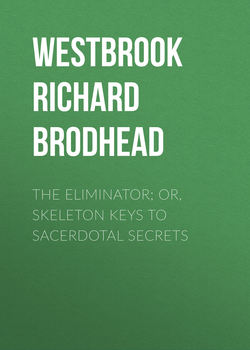Читать книгу The Eliminator; or, Skeleton Keys to Sacerdotal Secrets - Westbrook Richard Brodhead - Страница 1
PREFACE TO THE SECOND EDITION
ОглавлениеTHE Eliminator has now been before the public nearly two years. I have seen nothing worthy of the name of criticism respecting it. A few Unitarian ministers have said that Christ must have been a person instead of a personification, for the reason that men could not have conceived of such a perfect character without a living example, and that the great influence exercised by him for so long a time, over so many people, proves him to have been an historic character. These arguments are anticipated and fully answered. (See pp. 283, 284, 306.)
Our Unitarian friends are the greatest idealists upon the globe! They only accept the Gospel biography of Jesus (and we have no other) just so far as the story accords with what they think it ought to be. They deny the immaculate conception and miraculous birth of the Christ, and have very great doubts about his crucifixion and resurrection. Their Christ is purely ideal. The fact is that Christendom has worshipped the literal Jesus for the ideal Christ for nearly twenty centuries, though their conceptions of him have been manifold and contradictory. No wonder that so many intelligent Christian sects in the early ages of the church utterly denied the existence of Jesus as an historic person. (See pp. 266, 267, 357.) But there is indubitable evidence that this Christ character (called by many Unitarians the “Universal Christ”) was mainly mythical, drawn from the astrological riddles of the older Pagan mythologies.
In fact, almost everything in Christianity seems to have been an afterthought. It is the least original of any of the ten great religions of the world, and the great mistake has been in making almost everything literal which the wise men of ancient times regarded as allegorical. This comes from the priestly attempt to identify the Jewish Jesus with the Oriental Christ Tradition is, in fact, the main foundation of the Christian scheme, and cunning sacerdotalists have done by artifice what history, in fact, has failed to do. But for its moral precepts and its “enthusiasm of humanity,” Christianity would not survive for a single century. The so-called “Apostles’ Creed” (which was not formulated until centuries after the last Apostle slept in the grave), and which is repeated in so many churches every Sunday, has a greater number of historical and theological misstatements than any other writing of the same length now extant!
There is in our day a general disposition to magnify the virtues of the Christ of the New Testament, connected with a proposition to unite all Christians in his leadership. This device will not succeed, because it is as impossible to found a perfect religion upon an imperfect man as it is upon a fallible Book. Lovers of the truth will show that the traditional Christ is not a perfect model. (See Chapter xiii.) There is a most significant sense in which it may be truthfully said: “Never man spake like this man,” as no great moral teacher ever uttered so many things that needed to be revised and explained!
May it not be the fact that both Catholic and Protestant Christians are under a great delusion as to the facts of religion? I think so. I believe so. I well know how difficult it is to explode a delusion that is nearly twenty centuries old, and that is supported by a sacerdotalism of vast wealth and learning, and whose votaries by “this craft have their wealth.”
I nail these Thèses to the church doors of all the Catholics and Protestants in Christendom, and with Martin Luther, at the Diet of Worms, I exclaim, “Here I stand. I cannot move! God help me!” If I am mistaken, then my reason is at fault and all history is a lie! It is said that when Renan died, the Pope inquired whether he had confessed before his de-cease, and upon being told that he had not, replied, “Well, then God will have to save him for his sincerity!” I am ready to be judged on this ground. I sum up my latest conclusions thus: The Jesus of the Gospels is traditional, the Christ of the New Testament is mythical.
B. WESTBROOK.
1707 Oxford Street,
Philadelphia.
October 1, 1894.
